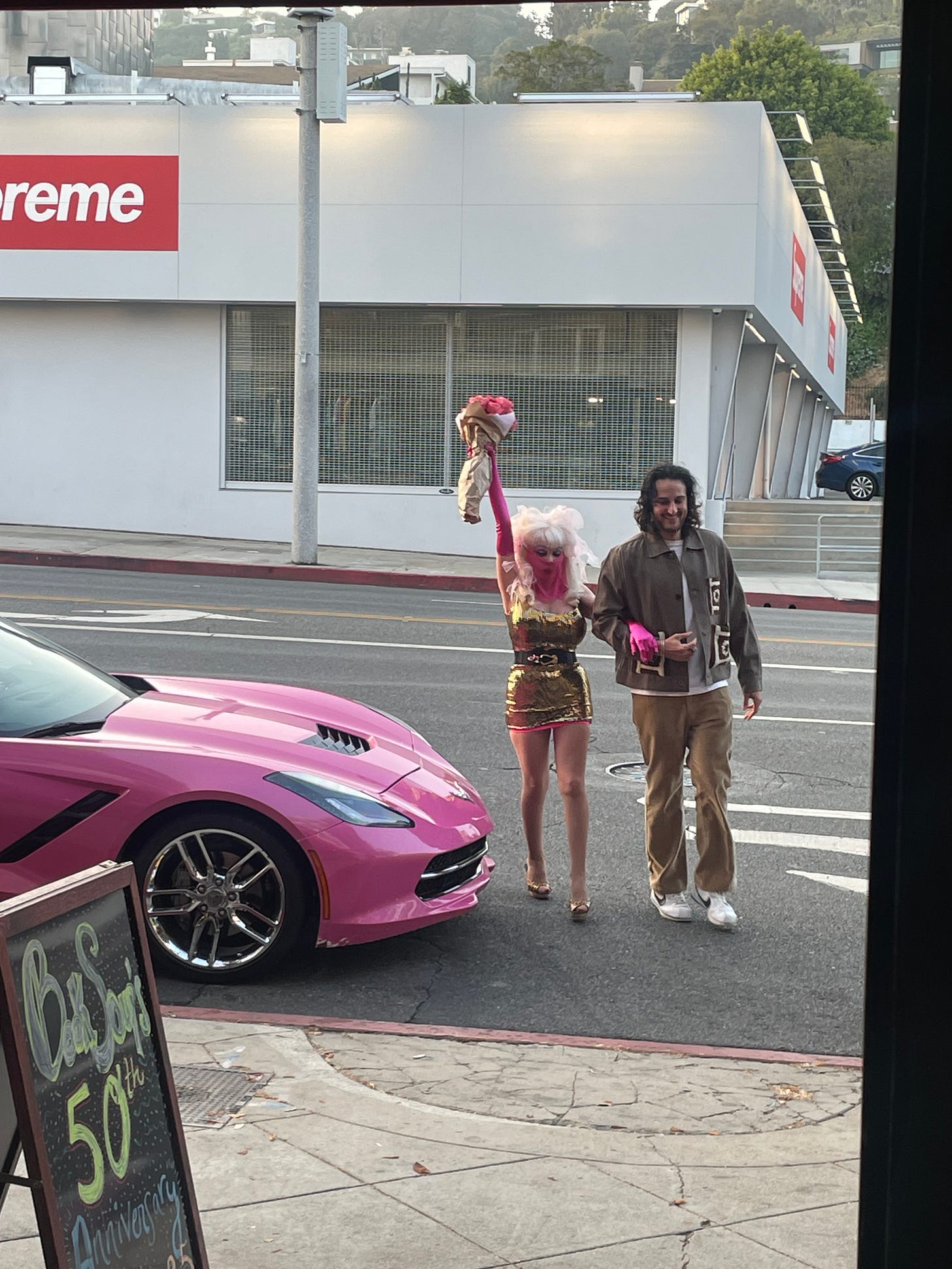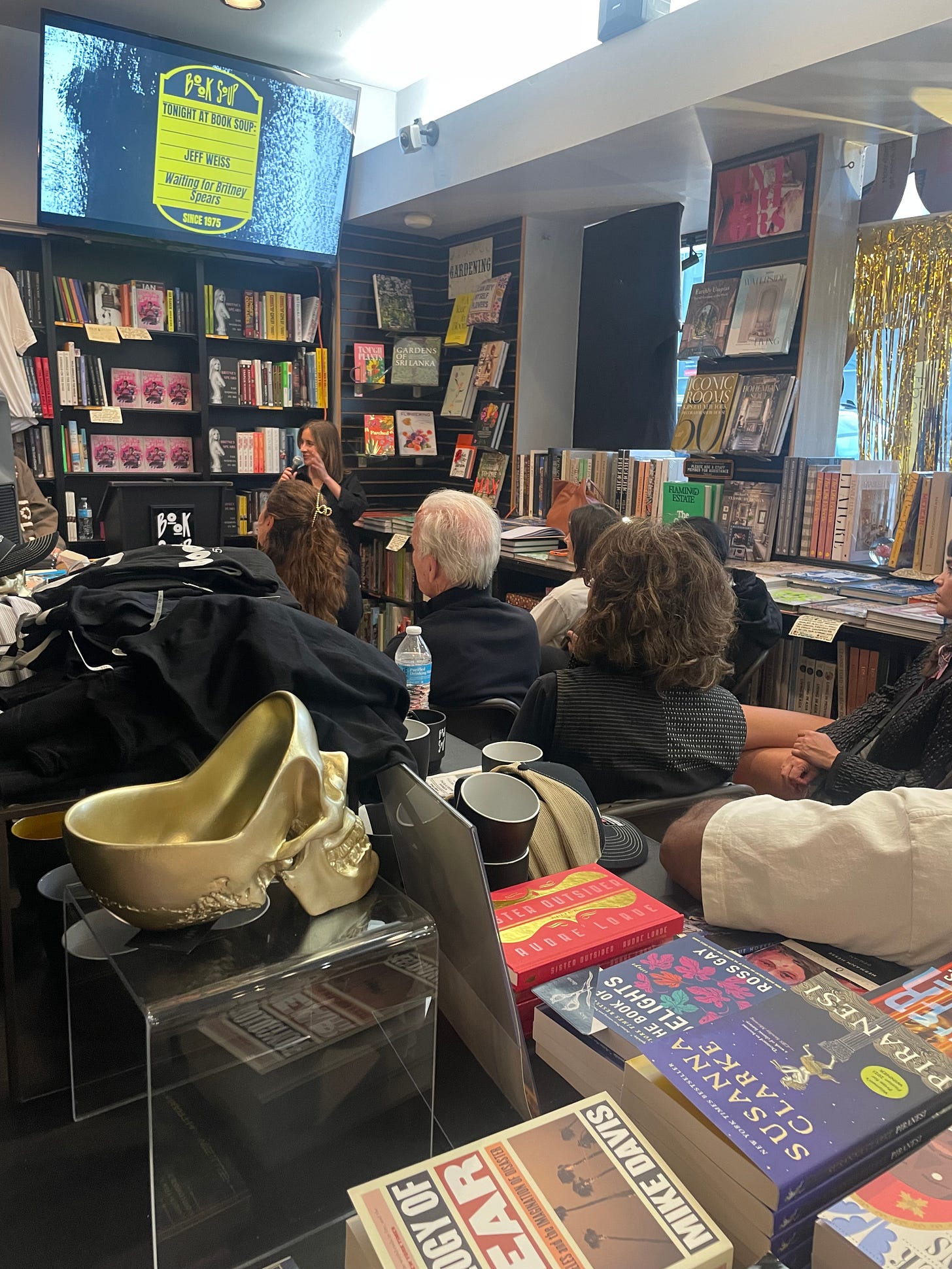DISPATCH: The Launch of "Waiting for Britney Spears: A True Story, Allegedly" (Book Soup, Los Angeles)
A woman is never just a woman, doubly so if that woman is a public figure. If novels, biographies, and celebrity profiles are to be believed, women exist as vessels for capitalism, neoliberalism, the death of innocence, etc. From one vantage, this is a curse; from another, we women are lucky; our meaning is decided for us.
Jeff Weiss knows this trap. It's what his new memoir is about. Waiting for Britney Spears: A True Story, Allegedly, tackles the ravenous tabloid and celebrity culture that loved Brittney Spears so much, it wanted her dead. Weiss, who joined Star Magazine as a tabloid reporter during this era, tells the audience at his book launch, “Some of my smartest friends are US Weekly fact checkers.” Melding fact and fiction with his own experience, he dissects that glistening, sleazy time in our cultural history when Britney Spears, like Marilyn Monroe before her, captured our national attention, and we punished her for it.
For all his self-awareness and brilliance, Weiss is also guilty of committing the very voyeurism he interrogates. Waiting for Britney Spears is a Perez Hilton-styled account with a masterful literary spin, Capote’s take on Page Six. Weiss gets away with it–maybe on sheer audacity and wit. Where, generally, I’m bored by male authors gazing upon a famous woman– her unchecked chaos, her pain, and girlish sexuality– and deciding she is a metaphor for something else entirely, I’m equally forgiving of writers who refuse to mind their own business. I know many people who love Jeff Weiss dearly. They can’t all be wrong.
The launch takes place at Book Soup on the Sunset Strip, only blocks from the faded glamour and hollow rock venues Weiss describes in his memoir. The reading is packed, filled with a who’s who of music and hip-hop writers. Nate Jackson, the music editor of The LA Times, gets a spirited shout-out from Weiss.
Almost twenty minutes into the reading, Angelyne–the blonde-haired, kitschy Hollywood icon– crawls out of a hot pink Corvette. Her unprompted arrival beguiles the crowd inside Book Soup, and they burst into satisfied laughs. Weiss interrupts the reading to greet and pose with her outside as onlookers film it on their phones. It’s a well-planted campy spectacle. A woman next to me, presumably working with Jeff, jokes: “We paid a lot of money for her to do this.”

After Angelyne’s interlude, Weiss continues to read, describing the starlets of the time with delightful and comical snark. In his rendering, Lindsay Lohan is a “raspy chaos phantom.” The Olsen twins are dressed as “beatnik gymnasts.” He points out that Kim Kardashian was once Paris Hilton’s assistant, which gets a light chuckle from the crowd. The crowd enjoys hearing the cultural mythology that defined our childhoods repeated back to us. We feel nostalgia for the era of drug-fueled club nights, speculated hook-ups, and rivalries between impossibly thin women splashed across tabloids. It was so simple back then, in a way it will never be again.
At one point, Jeff whispers as an aside, “If you were there, you were there” about an insular detail from the book. It’s all so insular, so trivial, it begins to feel deceptively profound. Smart, I think, to market a book on the premise of being in on a well-kept secret. The reading concludes with the infamous Bimbo Summit, Paris Hilton “driving off down Sunset towards the edge of the earth.” The audience listens eagerly, imagining the scene with the sanctity of Jesus’ last supper.

Anna Dorn moderates the Q&A. She calls the book “wildly, sharply written.” Weiss is expertly entertaining, the type of brainy (if not annoying) writer you’d beg to be seated next to during a dinner party. It’s rare to find an author so hypnotizing, mimicking the bravado of the performers he admires. At the mention of Justin Timberlake, there are disapproving head shakes in the audience. Of course, Jeff brags, I hated him before anyone else hated him. (Congratulations). He goes on to extoll pop cultural trivia and sleazy hot takes. Like what? Well, he was once arrested on Brad Pitt’s property and once visited the Playboy Mansion. Ed Hardy is a literal nazi. Addison Rae has dead eyes. Tyler, the Creator’s whole aesthetic and sound are derivative of Britney Spears' “Why Should I Be Sad.”
I’m mesmerized by Weiss’s punchy and pithy takes, even in the instances I find him exhausting and self-indulgent. When Anna Dorn asks about which chapters were the “least true”, Weiss slyly declines to answer. If male authors feel so comfortable hypothesizing about women’s interior lives, it’s tempting to point the same gaze back at them. Maybe I’ll return the favor.
Expectedly, Weiss also discusses Britney Spears as a metaphor for the death of the millennial dream, a flashpoint in our history where the future was once hopeful before it unraveled into its current state. “She’s the epitome of American perfection,” Weiss philosophizes. He is not talking about Britney the woman here, but rather Britney the archetype–the sexual innocence she symbolized and the violent misogyny that followed.
“I think we should all leave her alone,” he adds, which carries a tinge of irony, spoken from the gossip-y gonzo writer who was so entranced by a woman, he turned her into his own memoir.






